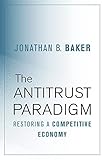The antitrust paradigm : restoring a competitive economy
Por: Baker, Jonathan B .
.
Tipo de material:  LibroEditor: Cambridge, Massachusetts Harvard University Press 2019Descripción: 349 p. 24 cm.Tipo de contenido: Texto (visual) Tipo de medio: sin mediación ISBN: 9780674975781.Tema(s): Competencia
LibroEditor: Cambridge, Massachusetts Harvard University Press 2019Descripción: 349 p. 24 cm.Tipo de contenido: Texto (visual) Tipo de medio: sin mediación ISBN: 9780674975781.Tema(s): Competencia| Tipo de ítem | Ubicación actual | Signatura | Estado | Fecha de vencimiento | Código de barras |
|---|---|---|---|---|---|
 Libro
Libro
|
Biblioteca y Centro de Documentación CNMC - Biblioteca de Competencia
Biblioteca especializada en Derecho de la Competencia, Derecho Mercantil y Economía Dirección C/ Barquillo, nº 5, 28004 Madrid
|
LIB-2468 (Navegar estantería) | Prestado | 06/10/2022 | 10140 |
In the 1970s, when the United States economy was struggling and the term "stagflation" was coined to capture inflation plus stagnant business growth, the "Chicago school" critique of antitrust rules gained ascendance. In the 1980s, during Ronald Reagan's two terms as president, that critique's policy prescriptions-the eliminating of or modifying anticompetitive rules to make them less restrictive-became common practice. As Jonathan Baker writes, "The Chicago approach to antitrust can be understood as a gamble. More relaxed antitrust rules would allow firms to achieve greater efficiencies, which would more than compensate for any risk of firms exercising market power. Put differently, the Chicagoans bet that antitrust reform could achieve long term consumer welfare gains without facilitating the creation of substantial and durable market power." The Antitrust Paradigm presents a wealth of evidence arguing that the Chicagoans lost their bet, and prescribes what should be done about it. Since the 1980s, not only has market power widened, economic productivity decline, and consumer welfare gains been modest at best, but also the economy has changed, most visibly in the information technology and Internet giants that top the financial market's valuation charts. Baker argues that both the failures of antitrust reform and the changed economy demand a new antitrust paradigm, one that restores a competitive economy through strengthened antitrust, recognizes antitrust's political context, and identifies the competitive harms from dominant information technology platforms. His book frames the problem, examines the distinctive competitive problems of the information economy, and concludes with a guide for restoring effective antitrust policies.

No hay comentarios para este ejemplar.